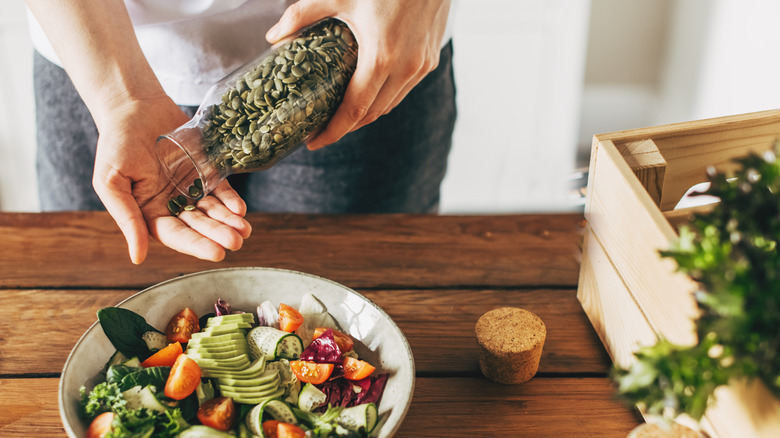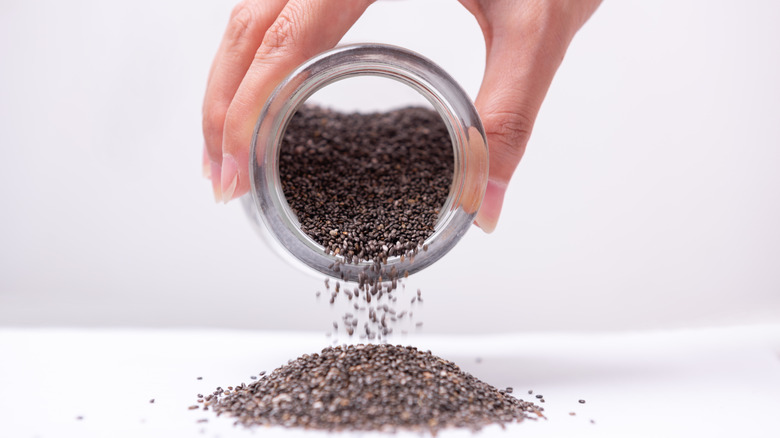Seeds You Should Be Eating If You Need More Zinc And Magnesium
Balancing all your nutritional needs can seem like a full-time job, especially since not all foods contain all the nutrients you need. (Here are some foods you probably thought were healthy, but actually aren't.) But as far as healthy diet additions go, seeds are a good option. Incorporating the right kinds into your diet can help you get enough of two key minerals: zinc and magnesium.
Zinc helps keep your immune system running at peak performance, and is essential for making DNA and proteins in the body. It may also help you recover from colds faster. A 2024 review in the Cochrane Database of Systematic Reviews showed that zinc consumption may shorten the duration of common cold symptoms.
Meanwhile, a 2023 review in Biological Trace Element Research noted a potential correlation between heightened sleep quality and magnesium intake. While not conclusive, these findings somewhat substantiate those of a 2012 study in the Journal of Research in Medical Sciences. The study looked at the effect of magnesium supplementation on older subjects with insomnia. After taking 500 milligrams of magnesium for eight weeks, the subjects reported overall improvements in their sleep. Apart from sleep benefits, magnesium also supports numerous important functions in the body.
In particular, three seeds can deliver a substantial amount of both nutrients: pumpkin seeds, sunflower seeds, and chia seeds.
Pumpkin seeds and sunflower seeds: power-packed snacks
Pumpkin seeds are decent sources of both magnesium and zinc. Every cup of pumpkin seeds has 649 milligrams of magnesium. With the daily recommended magnesium amounts hovering between 310 and 420 milligrams for most adults, that's more than enough to help you reach your goals. The same cup of pumpkin seeds provides about 9 milligrams of zinc; the recommended daily intake of zinc is 8 milligrams for adult women and 11 milligrams for adult men. (Oh, and on top of that, pumpkin seeds have more protein than an egg.)
What if you're not a fan of pumpkin seeds? You can substitute them with squash and gourd seeds, or try some sunflower seeds instead. A single cup of sunflower seeds has around 7 grams of zinc and 173 milligrams of magnesium. While those numbers are lower than what you'd find in the same serving size of pumpkin seeds, sunflower seeds do deliver enough of both nutrients to give a decent boost to your nutrition goals.
Are you getting enough magnesium and zinc in your diet?
Compared to pumpkin seeds and sunflower seeds, chia seeds are quite tiny, which means they can be sprinkled on foods easily. Additionally, they can be mixed with milk and turned into a sweet treat that you can have for breakfast or dessert. And they're full of nutrients: A one-ounce serving of chia seeds contains 1.3 milligrams of zinc and 95 milligrams of magnesium. (Here are other real health benefits of chia seeds.)
It's worth mentioning that adults living in the United States are at risk of being diagnosed with a magnesium deficiency. According to a 2018 article in Nutrients, around half the population may be lacking magnesium in their diets. Magnesium deficiency has been associated with numerous health disorders, including irregular heartbeat, muscle spasms, fibromyalgia, migraines, osteoporosis, metabolic syndrome, and other critical disorders related to the bones and heart.
Zinc deficiency isn't as common as magnesium deficiency for people in the United States — there are more cases observed in developing countries (per StatPearls) — but they can still occur. Your risk increases if you eat a vegetarian diet, since some plant-based foods contain compounds (e.g., phytate) that interfere with zinc bioavailability. Plus, up to 40% of individuals with inflammatory bowel syndrome and some with celiac disease may have insufficient zinc levels due to absorption issues. Children with sickle cell disease and those who are pregnant are also more likely to have a zinc deficiency.


